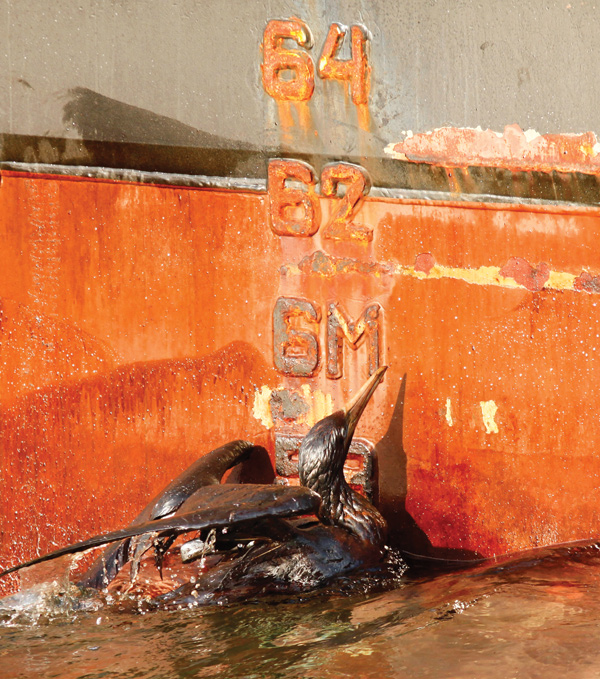Businesses won’t have to return payouts from BP


An oil-soaked bird struggles against the side of the HOS Iron Horse supply vessel at the site of the BP Deepwater Horizon oil spill in the Gulf of Mexico off the coast of Louisiana. BP argued Wednesday in New Orleans that a flawed funding formula in the settlement is giving money to businesses for questionable claims, and they should be forced to return it. But U.S. District Judge Carl Barbier says a deal is a deal. His ruling thwarts BP’s latest attempt to control its soaring liability from the spill, which may be nearing $50 billion.
Associated Press
NEW ORLEANS
BP wants its money back — hundreds of millions of dollars of it — but a federal judge said Wednesday that the oil giant must keep its promises to the companies it compensated for losses they attributed to the 2010 Gulf oil spill.
BP argued that a flawed funding formula enabled many businesses to overestimate spill-related claims, and some “weren’t warranted at all.”
U.S. District Judge Carl Barbier agreed several weeks ago to change the compensation formula for any future payments, but he ruled Wednesday that a deal is a deal when it comes to money BP already has paid out.
Under that deal, claimants agreed to drop their lawsuits, and BP agreed that no future court action could change their payments.
The ruling thwarts BP’s latest attempt to control its soaring liability from the spill, which may be nearing $50 billion.
“BP disagrees with today’s decision and will appeal it,” company spokesman Geoff Morrell said. “We asked the Court, as a matter of equity and fairness, to order the return of excessive payments.”
Barbier said he would rule later on the issue of compensation for cleanup workers whose chronic medical problems weren’t diagnosed until after the deal’s cutoff date of April 16, 2012. The settlement entitled cleanup workers with chronic conditions including rashes and breathing problems to receive up to $60,700 if the problems first surfaced within days of their cleanup work.
Barbier ruled in July that, as BP contends, those payments can go only to people diagnosed before that date, and any plaintiffs diagnosed later must prove in court that their illness was linked to their spill work. Plaintiffs’ attorneys asked him to change his mind, arguing that the cutoff date would keep most of the affected workers from collecting. Many of these workers couldn’t afford to pay doctors right away, and neither patients nor doctors knew what medical tests were required before the settlement was signed, they argued.
The plaintiffs’ attorneys said the cutoff date was meant for people with “diseases, like cancers, that would likely take years to manifest.”
BP still is facing a financial nightmare from the nation’s worst oil disaster, which began with an explosion that tore open the oil company’s Macondo well on the floor of the Gulf of Mexico, destroying the Deepwater Horizon drilling rig and killing 11 workers.
 43
43
